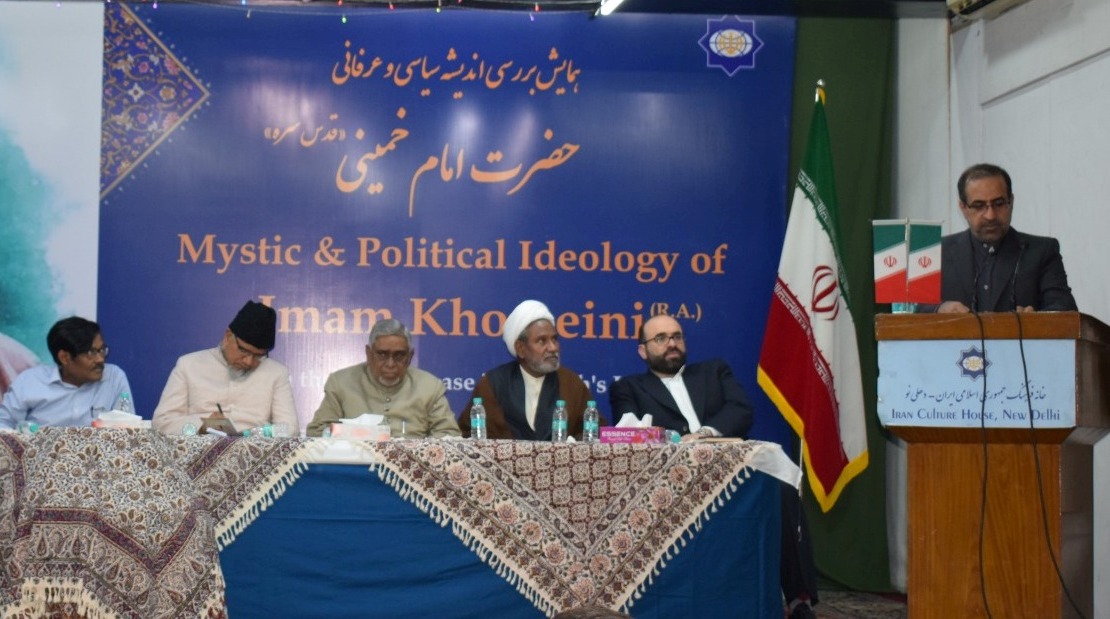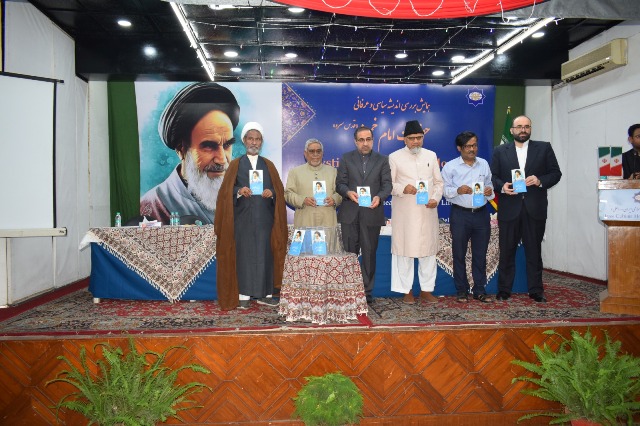Axis of Power Shifting from West to East, says Dr. Iraj Elahi Ambassador to Of I.R.Iran to India
Ambassador of the Islamic Republic of Iran to India Dr. Iraj Elahi said on Monday that the balance of power in the world is shifting from the West to the East as the hegemony of the United States is breaking apart

Ambassador of the Islamic Republic of Iran to India Dr. Iraj Elahi said on Monday that the balance of power in the world is shifting from the West to the East as the hegemony of the United States is breaking apart.
He expressed his opinion on the changing world order while speaking at an event on the 34th Death Anniversary of Ayatollah Ruhollah Imam Imam Khomeini (R.A.), late Spiritual leader of the Islamic Revolution of Iran, organised by the Iran Culture House in New Delhi.
“Today, the world is entering a new order. The unipolar hegemony of the United States has been challenged by rising power of countries like Russia, China and India. The fulcrum of power is shifting from the West to the East. Asia is gaining unprecedented sway in world affairs. More importantly, the spirituality in the world is rising and the weak have refused to be exploited by the powerful. In such a milieu, Imam Imam Khomeini ’s message of applying spirituality in practical life becomes a guiding light for the awakened people of the world,”.
The Iranian envoy said that Imam Imam Khomeini and his revolutionaries defeated the US and its evil designs when they were at the peak of their powers and were considered invincible. “From the Day 1, Imam Imam Khomeini based his politics on the principles of Islam and that gave him so much spiritual strength that he never buckled under pressure from hegemonic powers. He in fact emboldened the developing nations of the world to neither join the West nor the East and chart their own destiny. Today, we are witnessing that world affairs have undergone a sharp transformation and the countries hitherto oppressed are expressing themselves with confidence,” he said.
He added that one of the major foreign policies of Iran under revolutionary governments has been unwavering solidarity with Palestinians and it will not change. “Imam Khomeini institutionalized the Quds Day, the day devoted to Palestinians and their cause. Despite utmost pressure from Israel and the US, Iran hasn’t changed its policy and will abide by the people who have been invaded and denied their due for so many years,” he said.
Such sentiments were echoed in views of other speakers who highlighted new aspects to Imam Khomeini ’s personality and the Islamic Revolution that he and his comrades pulled through in Iran.
Prof. Salim Engineer, Vice-President of Jamaat-e-Islami Hind, said that Imam Khomeini is not an important figure only to Iranian people; he is a vanguard of hope for all struggling people all across the globe.
Prof. Salim said that people like Imam Khomeini , Sayyid Qutb and Syed Abul Ala Maududi advocated Islam as an alternative statecraft model in comparison to other systems.
“Though prominent social and political changes after the Revolution were evident only in Iran, its undercurrents were felt throughout the world. At that time, we were students and remembered that political ideas like Communism and Socialism had dominated the discourse. In such a challenging scenario, Imam Khomeini and his revolutionaries proved that Islam can present an alternative system and that it doesn’t restrict but enlighten people to make advancements in every field, be it Science, Technology, Medical Sciences, Social Sciences, and so on. As a result, we see that today Iran enjoys a unique status among countries that are reaching new horizons of scientific and technological milestones,” he said.
Prof. Salim also highlighted a key aspect of Imam Khomeini ’s personality that illustrates how the blend of mysticism, or spirituality, with politics shapes personalities of public figures. “He never gave in before superpowers of the time. He never compromised on his just stands. He coined ‘la sharqiya la gharbiya, umma wahda Islamiya’ (no East, no West, one unique Islamic umma) which continues to be a powerful slogan to generate unity among Muslim countries. It’s high time that Imam Khomeini ’s teachings are understood deeply and imbibed,” he said.
Renowned scholar of Islamic Studies Prof. Akhtarul Wasey said that those who know the crux and soul of Imam Khomeini ’s contribution to world politics in general and Muslim world in particular will never feel that he is no more among them. “His mundane and mystic achievements continue to live and inspire people. His politics, as his life, was based on surrender to the will of God and he strived for a society that is bereft of inequality. He vehemently opposed sectarianism among Muslims and remained a strong proponent of the unity of Muslim ummah,” he said.
Prof. Wasey elaborated that to establish a system based on Islamic values after defeating shahenshahiyat (monarchy) was a gargantuan task and could only be attained by a spiritual personality of the stature of Imam Khomeini . “Today, you see Islam in every walk of Iranian life. You can see women living with dignity in hijab and working in offices, teaching in universities, serving in the security forces and even working in corporate houses. This transformation within a short span of time after the ouster of a monarch was only possible as the leadership led by Imam Khomeini lived Islam and implemented Islam,” he said.
He said that Imam Khomeini lived the life of a faqeer (hermit) and also rose to rule like a faqeer. “Allama Iqbal’s couplet aptly captures his life: Mera Tareeq Ameeri Nahin Faqeeri Hai, Khudi Na Bech Ghareebi Mein Naam Paida Kar (The way of the hermit, not fortune, is mine; Sell not your soul! In a beggar’s rags shine)
Wasey added that the institution of Wilayat e Faqih (the rule of a just and capable jurist) came into force with Imam Khomeini and runs robustly through Ayatullah Ali Khamenei, his successor and the present Supreme Ruler of Iran. “It’s another success of Imam Khomeini ’s spiritual ascent and just politics that he found a successor of equal caliber and character,” he said.
Shia Imam-e-Juma (Friday prayer imam) of Delhi Maulana Mumtaz Ali was a student in Iran when the Islamic Revolution was in the churn. He shared several insightful anecdotes to illustrate how Imam Khomeini -led Iranians sacrificed for the sake of their nation and principles. “Imam Khomeini ’s irfan (mysticism) and siyasat (politics) was an excellent mix of perfection meeting practicality. His words were weaving magic among youths of Iran. When Imam Khomeini was in Paris, his secret messengers would carry audio cassettes of his speeches hidden inside books to Tehran, Qom and other cities. Though this daring act was punishable with death and some of them were chopped to death for this. Still, they continued to carry the Imam’s words and they stirred the youths of Iran to a point that they finally overthrew the Shah, the monarch,” he said.
In another interesting tale, he said that a renowned Indian journalist, who is still alive, went to Tehran to interview revolutionary leaders and he didn’t find support for the revolution in some areas of Tehran that he visited. “But when he did more research, he found that only those households were not supportive of the revolution where understanding of the tragedy of Karbala was weak. He told us that the day the youths of those families would know it, they too would join the revolution,” he said.
Maulana Mumtaz Ali added that he saw Imam Khomeini from close quarters and found him as saintly before assuming power as he was after. “Power changes people. It changes them so much that they change their lifestyle, their eating habits and even their clothes. But, Imam Khomeini , as you yourself can see from pictures and videos, remained unchanged,” he said.
In his student days in Iran, he recounted, the local doctors were not trusted by foreign students as scientific progress was acutely low. “But, now people all across the world take patients to Iran for treatment. The Republic captured enemy drones and has started manufacturing its own versions of avionic machines. Isn’t it absolutely incredible for a country that has been under crippling sanctions for most part of its history after 1979 and there was a time when a faulty part of an aeroplane had to be sent abroad on an aeroplane for repair,” he said amid rapturous applause by an overflowing audience that included a number of women.
Imam Khomeini is reverentially called Imam, the leader, by the Iranians and his followers worldwide.
Dr Farid Faridasr, the Cultural Counsellor of I.R.Iran, New Delhi said that, “Imam’s overall personality was a manifestation of the spiritual journey that he undertook in his lifetime. However, being spiritual for him was not being aloof from the world. In fact, he emphasized on socially and politically active spiritual life. Later, it reflected in his politics that has left an everlasting mark on the political happenings of the world,” he said.
He added that Imam Khomeini ’s mystic message is naturally suited to people in India as India is a spiritual country where simplicity is valued.
Among the speakers was also Professor Akhlaque Ahmad Ahan from the Department of Persian Studies, JNU. He presented pieces of Imam Khomeini ’s mystical poetry to drive home his point that Imam Khomeini ’s poetry has reflections of Persian legends Sheikh Sa’adi and Hafiz Sherazi.
He cited an example (translated): I am drunk with the wine of Thy (God) love, so from such a drunkard Don’t ask for sober counsel from me, O man of the world.


Write your comment.